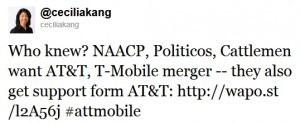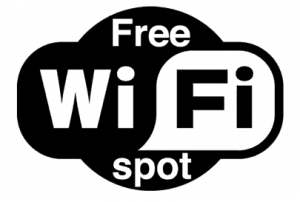
Phillip Dampier
This week, the tech community has been buzzing over new entrants in the world of cloud computing. Apple’s iCloud in particular has sparked enormous media coverage as the company plans to encourage customers to access all of their favorite content over their broadband connection. Apple is also moving towards online distribution of many of its software products, including the forthcoming OS X Lion operating system, suggesting consumers can pass up traditional physical media like CD-ROMs or DVDs.
Cloud storage theoretically allows you to store your entire music, video and photo collection online for easy access from any device. Watching the 20-somethings buzz about 100GB+ secure file lockers and the end of traditional file storage as we know it has been amusing, but these people need to get their heads out of the clouds. Unless they become politically involved in America’s broadband debate, it is not going to happen the way they hope it will.
Tech entrepreneur? Meet broadband provider reality check: the Internet Overcharging usage cap and “excessive use” pricing scheme.
While Steve Jobs was introducing iCloud, broadband providers and their industry friends have been ruminating over the impact all of this new traffic will have on their broadband networks. In an homage to former AT&T CEO Ed Whitacre’s “you can’t use my pipes for free,” the drumbeat for implementing “control measures” for cloud computing and video traffic has been amplified several times over by certain providers, Wall Street analysts, and their trade press and equipment supplier lackeys.
One alarmed provider pondered the impact of iCloud in terms of their past experience with iTunes, which also spiked traffic when it was first released. Others balk at the notion of consumers using broadband platforms to move entire libraries of content back and forth, especially on wireless networks. The only sigh of relief detected? Apple won’t start iCloud with video content — just music, at least at first.
The enemies list
 The biggest targets — the companies that get a lot of pushback from providers for using “their networks” to earn millions for themselves are Google, Netflix, Amazon and Apple. Each of them are rapidly moving into the online entertainment business, threatening to provoke more cable TV cord-cutting. Netflix is now responsible for 30 percent of online traffic during primetime hours, a fact that some use as an accusation — as if Netflix should be held to account for its own success. Amazon has opened its own cloud based music storage and is also increasingly getting into online video content streaming. Apple has a novel approach at handling its forthcoming iCloud music feature which should save hours in uploading, but the company is also moving towards online distribution of a growing proportion of its software, including the huge bug fixes and upgrades that will easily exceed a gigabyte if you own several Apple products.
The biggest targets — the companies that get a lot of pushback from providers for using “their networks” to earn millions for themselves are Google, Netflix, Amazon and Apple. Each of them are rapidly moving into the online entertainment business, threatening to provoke more cable TV cord-cutting. Netflix is now responsible for 30 percent of online traffic during primetime hours, a fact that some use as an accusation — as if Netflix should be held to account for its own success. Amazon has opened its own cloud based music storage and is also increasingly getting into online video content streaming. Apple has a novel approach at handling its forthcoming iCloud music feature which should save hours in uploading, but the company is also moving towards online distribution of a growing proportion of its software, including the huge bug fixes and upgrades that will easily exceed a gigabyte if you own several Apple products.
Google is a frequent Washington target and honestly delivers the only truly effective corporate pushback to anti-consumer broadband pricing some providers have contemplated. In fact, Google is putting its money where its mouth is building a gigabit network larger providers repeatedly scoff at as unnecessary, too costly, and too complicated.
While millions in venture capital funds new online innovations, only a miniscule amount of money is being spent to counter the lobbying major providers are doing in Washington to redefine the broadband revolution in their terms, complete with usage pricing that bears no relation to cost, arbitrary usage limits, and ongoing lack of true competition.
Online innovation is grand, but allowing providers to strangle it with Internet Overcharging schemes guarantees to end the party real fast.
Individually, none of the new cloud services are likely to blow out usage caps in excess of 100GB, but in combination they certainly could. Anyone using online file backup, cloud storage of video and large music collections, uses Netflix or other online streaming services, and spends lots of time on the web will easily approach the limits some providers have established. That doesn’t even include large software updates. Unless you have an unlimited usage plan on the wireless side, don’t even think about using most of these services with AT&T’s 2GB monthly wireless usage cap.

Glenn Britt: The Internet is a utility which is why we can keep raising the price.
In the handful of countries with ubiquitous Internet Overcharging, little of this will pose a problem — companies won’t launch cloud computing services in markets where usage caps will effectively keep customers from using them.
That is why it is critical for some of America’s largest technology companies to get on board the fight against Internet Overcharging, and demand Washington recognize broadband as a utility service that should be wide open and usage cap free. The evidence is right in front of you. Time Warner Cable CEO Glenn Britt recognizes the fact broadband is an essential part of our lives today, which is why he is confident enough to keep raising the price and charging even more in the future. It’s not about “network congestion,” “building the next generation of broadband,” or “pricing fairness.” Stop the Cap! started at ground zero for Time Warner Cable’s 2009 version of “pricing fairness” — $150 a month for an unlimited use broadband account that likely cost major providers less than $10 a month to provide. It’s about pure, naked profiteering, unchecked by free market competition in today’s broadband duopoly.
Unless a company like Google can vastly expand its own broadband rollouts, it is increasingly apparent to me (and many others), we may have to move towards an entirely different model for broadband in the United States — one built on the premise of the Interstate Highway System. One advanced, publicly-owned fiber network open to all providers on which telecommunications services can travel to homes and businesses from coast to coast.
Nobody says private companies shouldn’t be able to compete, but every day more evidence arrives they will never be inclined to deliver the next generation of service that other countries around the world are starting to take for granted. They will instead protect their current business models at all costs, even if that means throwing America’s broadband innovation revolution under the bus.
[flv width=”640″ height=”380″]http://www.phillipdampier.com/video/CNN Will iCloud Measure Up 6-7-11.flv[/flv]
CNN takes a look at what makes Apple’s iCloud service different from competitors from Google and Amazon. (5 minutes)
[flv width=”640″ height=”380″]http://www.phillipdampier.com/video/CNN Dropbox Cloud Computing 6-8-11.flv[/flv]
CNN talks with the folks at Dropbox about their cloud file storage system. (3 minutes)
 Time Warner Cable CEO Glenn Britt says the cable company is once again testing technology to allow it to implement the same type of Internet Overcharging system consumers immediately rejected in 2009.
Time Warner Cable CEO Glenn Britt says the cable company is once again testing technology to allow it to implement the same type of Internet Overcharging system consumers immediately rejected in 2009. Wall Street analysts told Bloomberg News they didn’t have a problem with it. Bloomberg also quoted Netflix CFO David Wells as saying he had no objection to Internet providers covering the cost of increasing bandwidth capacity. But Bloomberg quoted Wells speaking on a June 1 conference call, not in reaction to Britt’s specific announcement yesterday. Further, Wells clarified his comments were directed towards network optimization and traffic shaping, not broadband usage caps.
Wall Street analysts told Bloomberg News they didn’t have a problem with it. Bloomberg also quoted Netflix CFO David Wells as saying he had no objection to Internet providers covering the cost of increasing bandwidth capacity. But Bloomberg quoted Wells speaking on a June 1 conference call, not in reaction to Britt’s specific announcement yesterday. Further, Wells clarified his comments were directed towards network optimization and traffic shaping, not broadband usage caps.

 Subscribe
Subscribe









